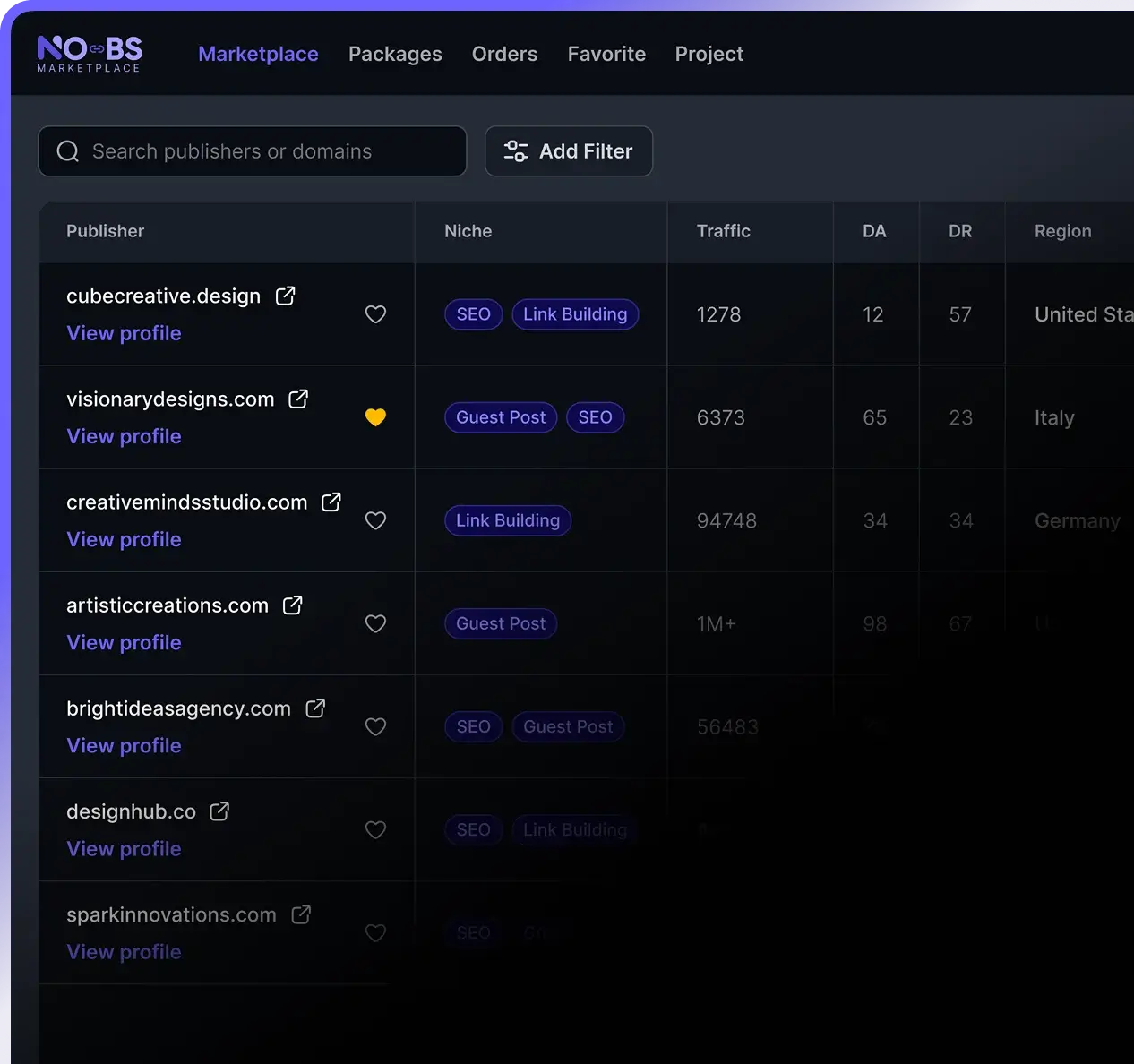Complete Link Building & PR Marketplace
Helping thousands of SEO professionals
Trusted by
Direct access to over 110,000+ Publishers
Explore Our MarketplaceNO-BS Marketplace Featured Services
Guest Posts
Publish high-quality articles on real websites to boost rankings and brand authority. Every placement is natural, relevant, and built to last.
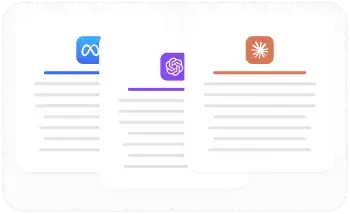
Link Insertion
Add contextual backlinks into existing, authoritative content. A fast, effective way to strengthen SEO signals.
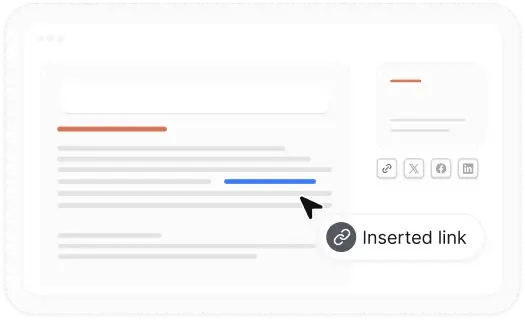
Digital PR
Quick access to international news site to publish editorial content, building brand trust and credibility
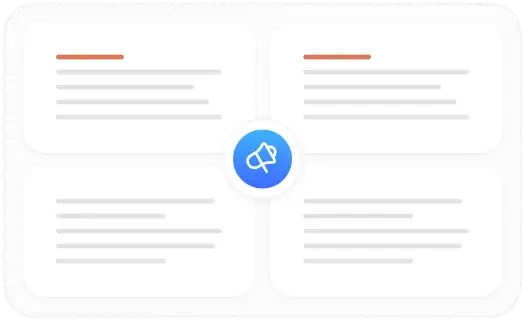
How NO-BS Marketplace Works
Create Account
Sign up in minutes. Get instant access to the marketplace and your own dashboard.
Select Publishers
Browse thousands of vetted websites with transparent metrics like DA/DR, traffic, and niche relevance. Pick the publishers that best fit your goals.
Placed Order
Set your target URL, anchor text, and content preferences. Our team takes care of the content and outreach for you.
Get Live Link
Once your link is published, you’ll see it in your dashboard. Every placement is backed by our 12-month live link guarantee!
NO-BS helps brands and businesses drive organic search and AI visibility — quickly and reliably.
Link Published
0
Articles Written
0
Global Publishers
0
What Makes NO-BS Different
Verified, Ranked Publishers
See every site before you buy: no hidden placements, and no surprises.
Content Writing
Our in-house writers and journalists write every article according to your needs.
Guaranteed Live Links
With our 12-month guarantee, every link goes live, or you get your money back.
NO-BS Pro
Fully outsource your link building with advanced analytics, dedicated project managers and strategy support. Perfect for agencies and enterprise.
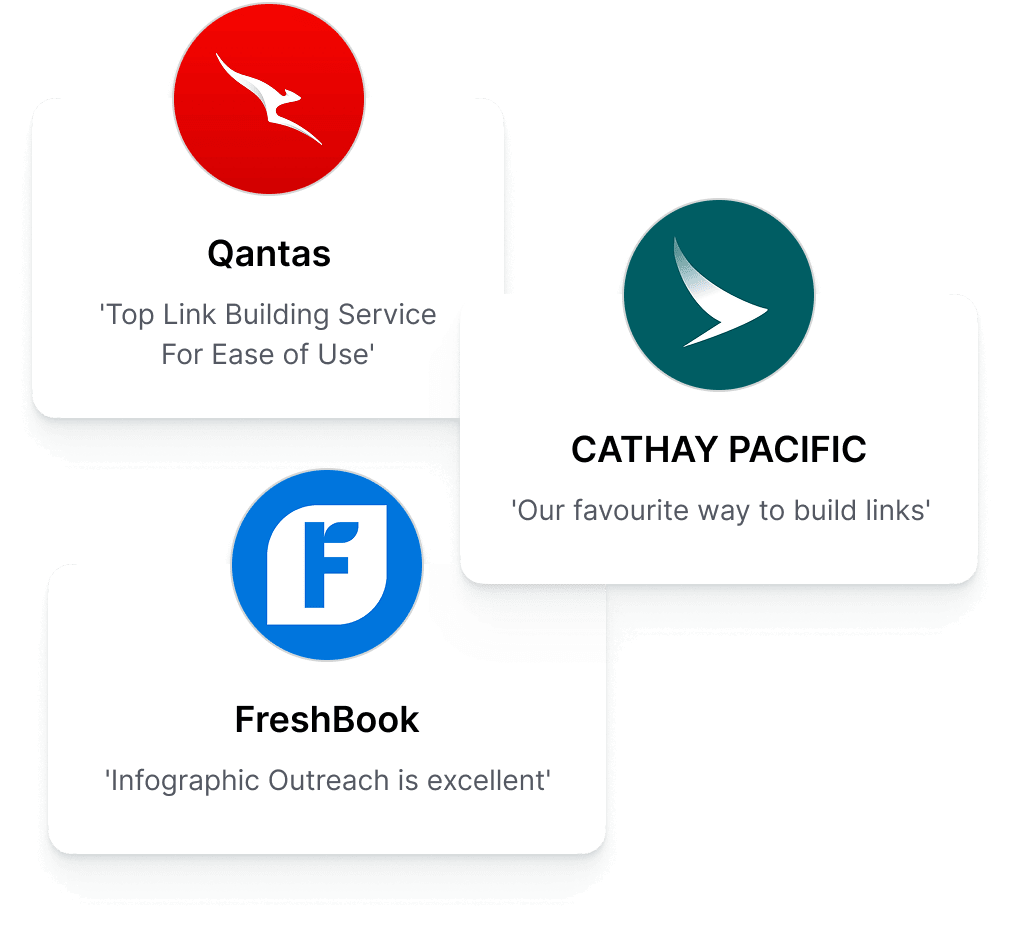
Results Speak Louder Than Words
Michael Hutton
Managing Director,
improveposition.co.uk
NO-BS is different. The fact that they allow us to see the publishers in advance was a complete win for us.
We know what makes a good link prospect - we just need someone to provide us with the opportunities so we can then implement our own quality control and NO-BS does exactly this with maximum transparency.
In addition to this, their customer support is seriously the best we have experienced. That is why we have stopped working with all other link suppliers and now solely use NO-BS for all our client outreach projects.

Justin Thomas
Founder of JourneyEngine

Suganthan Mohanadasan
Digital Marketing Consultant
I have been using NO-BS for the past months. The team does legitimate outreach compared to a few other shady link marketplaces. They offer a unique pricing model and connect us with the webmaster directly. They are also transparent about their overall process.

Mike Quayle
Managing Director - Marketeering Group
We’ve worked with NO-BS for years, and we’re always happy with the service! Adding link building to our retainers with clients has helped us 3x our large retainers, and completely transformed how quickly we’re able to demonstrate SEO results. We wouldn’t be able to run our SEO as efficiently as we do without support of NO-BS. An easy-to-use self-service system, rock solid support, and an ever-growing publisher database all make NO-BS our preferred link building vendor!
Austin Cline
Founder, sitemap.io
We've been using the No-BS Platform for several years now and have consistently gotten good links for our clients. What we love is the control we have over the website and content topics.
For larger brands, this is important because they're very careful who links back to their website. No-BS give us a safe but effective way to build links at scale while still growing our clients' organic traffic.
Olga Rusnak
Head of Marketing - Cedalo
What I like about NO-BS is that this company takes over all the link-building hassle off my shoulders. It is an actual marketplace where I can buy links or insertions in a couple of clicks, provide instructions, and, in about a month, get a Do-Follow backlink to my site. It involves minimum effort from my side. The rest of the activities, such as communicating with the donors, including agreeing on a topic and paying them, and managing the creation of guest blog posts, are all performed with due diligence by the NO-BS company.
Brent Carnduff
Director, advisorrankings.io
I've offered Link Building for a number of years, but have always struggled with pricing and the time it takes. No-BS has removed those hurdles.
I now easily move my clients into on-going link building retainers, obtain quality links for them, and have grown my business. I highly recommend their services.
Sireesha Narumanchi
Founder, Crowd Work News
Thanks to the entire team at NO-BS for providing authentic and quality link building services with the utmost care. Good luck in their journey.

Ryan Stewart
WEBRIS
Paul Skirbe
Principal, skywardstrategies.com
Nobsmarketplace is a delight to use and has streamlined our entire link building operation. I always hated the lack of transparency in where we were in obtaining a link. With Nobs, I can see everything and how much further we need to go. Helps me communicate with clients in a far less stressful way. Keep up the good work.

Dave Nillson
Director - The converted Click
We’ve found it difficult in the past to find quality and reliable services in outreach, guest blogging and content creation. I can honestly say that NO-BS has been an incredible service and digital partner in our journey. Response times are excellent and the content is extremely well written and relevant to any niche we have thrown at the team.
Daniel Paviour
Snr SEO consultant,
commonground.digital
No BS Marketplace has been incredibly useful in driving additional link building opportunities for the team. With a small team, our resources won't stretch to manual link building so NO-BS provides a great way to drive link building in a quick and secure way.
We know these links also drive traffic to our sites.
Frequently asked questions
Everything you need to know about the product and billing.
Turnaround times can vary. We work with real publishers. Ultimately, our goal is to complete every order as fast as possible without sacrificing quality.
Yes! We show the URL of our publishers so you can choose the ones that suit your marketing campaign.
Our pricing includes the publisher fee, admin fee and content fee.
If you require a high volume of links per month, we may be able to arrange a bulk-buy discount. This will depend on your desired link volume and the publisher metrics you require. Please contact us using the form below and a member of our team will be in touch with more information. If you’re already a client, book a discussion with your account manager so they can understand your needs.
You sure can! Writing your own content reduces the total cost you pay. You’ll have the option to select this after approving a publisher. Just click ’supply own content’ on the customisation page while ordering. Custom link building has never been easier.
We work with a wide variety of niches. These include business, finance, travel, family and children, technology/computers and health/wellness, just to name a few!
We focus on transparency, quality, and customisation, so you get the most out of your marketing campaign. We’re the only link building provider where you can see the publisher domain name before purchasing.
Yes, we offer fully managed link building services for those who prefer a hands-off approach.
